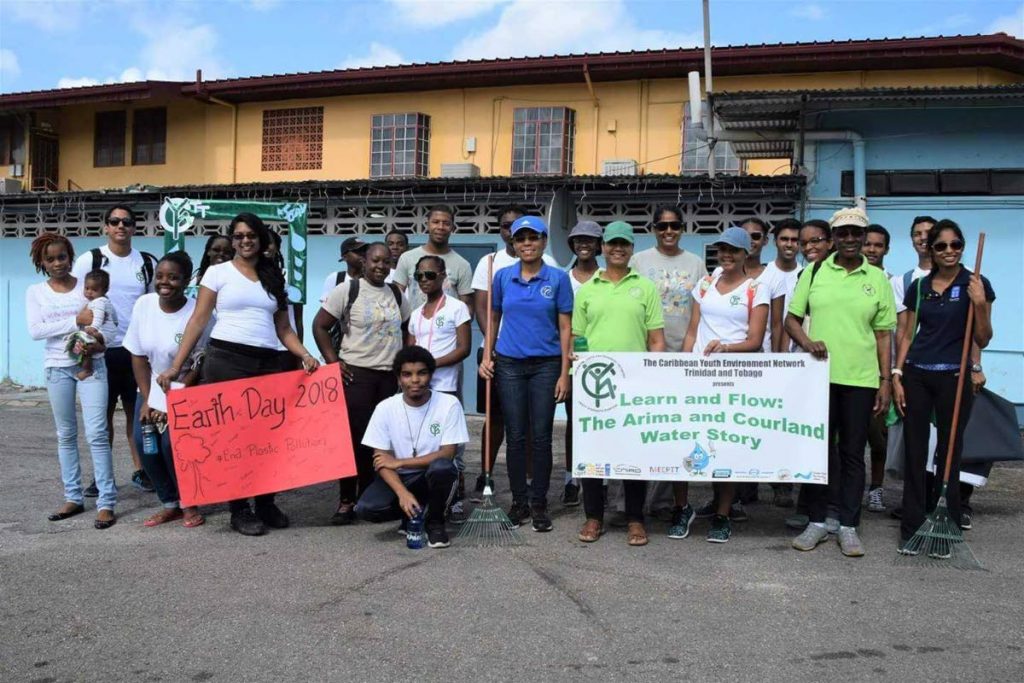TT ‘water warrior’ up for Commonwealth award

“Sustainability is not about right now; it’s creating the next steps so that what you do now does not have an impact on future generation. Young people should be involved in the process, because it’s inevitably going to affect our future,” said Curmira Gulston, 26, of Tacarigua.
Gulston is the national co-ordinator of the TT chapter of Caribbean Youth Environmental Network (CYEN), and has been named one of 16 finalists in the 2019 Commonwealth Youth Awards for the group’s work in water sustainability in critical TT watersheds. The awards are given to youth 15-29 "whose innovative projects are making a significant contribution to their communities and driving change in the implementation of the Sustainable Development Goals,” said a Commonwealth Secretariat press release on the awards.
The awards will be given on March 13 in London. The overall winner takes home £5,000. Gulston is one of 500 youths worldwide nominated for the award in four regions. She’s in competition with three other Caribbean/ Canada regional finalists. Ashley Komangaapik Rose Cummings works on health and wellness in Inuit communities in Canada, Ryan Robinson Perinchief runs a study and mentoring project for youth in Bermuda, and Johanan Dujon is making commercial agricultural products from sargassum in St Lucia.
Gulston joined CYEN, an organisation with 17 chapters all over the Caribbean, in 2014 after returning home from studying at the University of the West Indies (UWI), Mona. The Bishop Anstey East grad had earned a BSc in marine biology with a minor in conservation biology and would go on to take a master’s in integrated coastal and ocean management at the University of Trinidad and Tobago (UTT), Chaguaramas.

Curmina Gulston is third from left. Photo courtesy Caribbean Youth Environmental Network TT Chapter.
Her degrees exposed her to a “little background in water and sustainability,” she said at a recent interview at UNDP, Port of Spain, where she works as a programme assistant intern in the department of environment, energy and disaster management. Last year she took part in a UNDP workshop and a UNDP conference on Education for Sustainable Development, which prepared her for the project for which she is now being recognised.
The awarded project is Learn and Flow: The Arima and Courland Water Story. It began in 2016 with research, community engagement and networking; in 2018 CYEN began implementing the more visible public face of the project, going to schools and communities affected directly by the Arima and Courland watersheds.
With a UNDP GEF Small grant, and in partnership with the Water Resources Agency’s Adopt a River initiative, the Asa Wright Nature Centre, the Agricultural Society and the Santa Rosa First People’s Community, CYEN took the message of protecting and conserving the rivers and watershed to 300 community members and 1,200 schoolchildren.
Learn and Flow went to a dozen schools around the watersheds, including Whim Primary, Scarborough RC and Black Rock Government in Tobago, Arima Government Boys’ and Girls’ and Arima Hindu. Gulston and the team which she trained delivered presentations, staged sock puppet shows, and played trivia games with the pupils aged eight-12, asking questions like, “Where do you think your water comes from?”
“They were very appreciative of our approach to learning. Yes, some topics they had an idea about it. but they said, ‘Yeah, this is what Miss taught. but now I’m able to understand it better.’”
Though the project wasn’t her brainchild, as project manager Gulston would pour a lot of herself into Learn and Flow. She was working as a lab technician at Bonair Secondary while designing the presentations and implementing the project.
“I used my presence at the school to engage them, leading the environmental programme. I helped build the capacity of the environment club at the school and exposed them to Learn and Flow. Some students came out with us to participate in the school visits. It was cool to empower them as youths.”

It was, she said, “a lot of presentations at assemblies and meetings. But that was on me. You have to share the message.”
So what’s the message?
That there has been a significant decrease in water quality over the years and human behavioural changes can help resolve most of the problems facing watersheds.
Those problems, in Arima, include quarrying, improper garbage and sewage disposal, unplanned development and deforestation. In Courland, Gulston said, the biggest one is deforestation, which results in siltation of the rivers.
“It’s harder to get rid of the ‘unnecessaries’ to treat the water to have running water in your taps. The impact of human activities adds up to cause a decrease in water supply.”
Part of Learn and Flow was practical, involving river clean-up, tree-planting and water testing over six months in the Arima watershed. CYEN donated water-testing kits to the watershed communities so residents themselves are able to identify the main sites of negative impact and how this varies over time, Gulston said.
The project created young “water warriors.” said one young participant in a project video CYEN TT posted on its Facebook page.
As she waits to hear if she’s won the Commonwealth Young Person of the Year award, Gulston continues her work with CYEN. She is now leading a project on awareness of the Sustainable Development Goals.
“How do they interrelate and what is going on in TT already based on global goal actions and how can you fit into this picture?
"It’s always good to collaborate, partner, work together. We all have to work together to make the planet a better place,” she said.

Comments
"TT ‘water warrior’ up for Commonwealth award"